The Best Homemade Hummingbird Food Recipe
on Jul 09, 2019, Updated Jan 14, 2025
This post may contain affiliate links. Please read our disclosure policy.
Attract beautiful hummingbirds to your backyard or garden with this simple homemade hummingbird food recipe. Learning how to make hummingbird food will help you bring these busy little birds to your yard all season long and is a fun family nature activity!
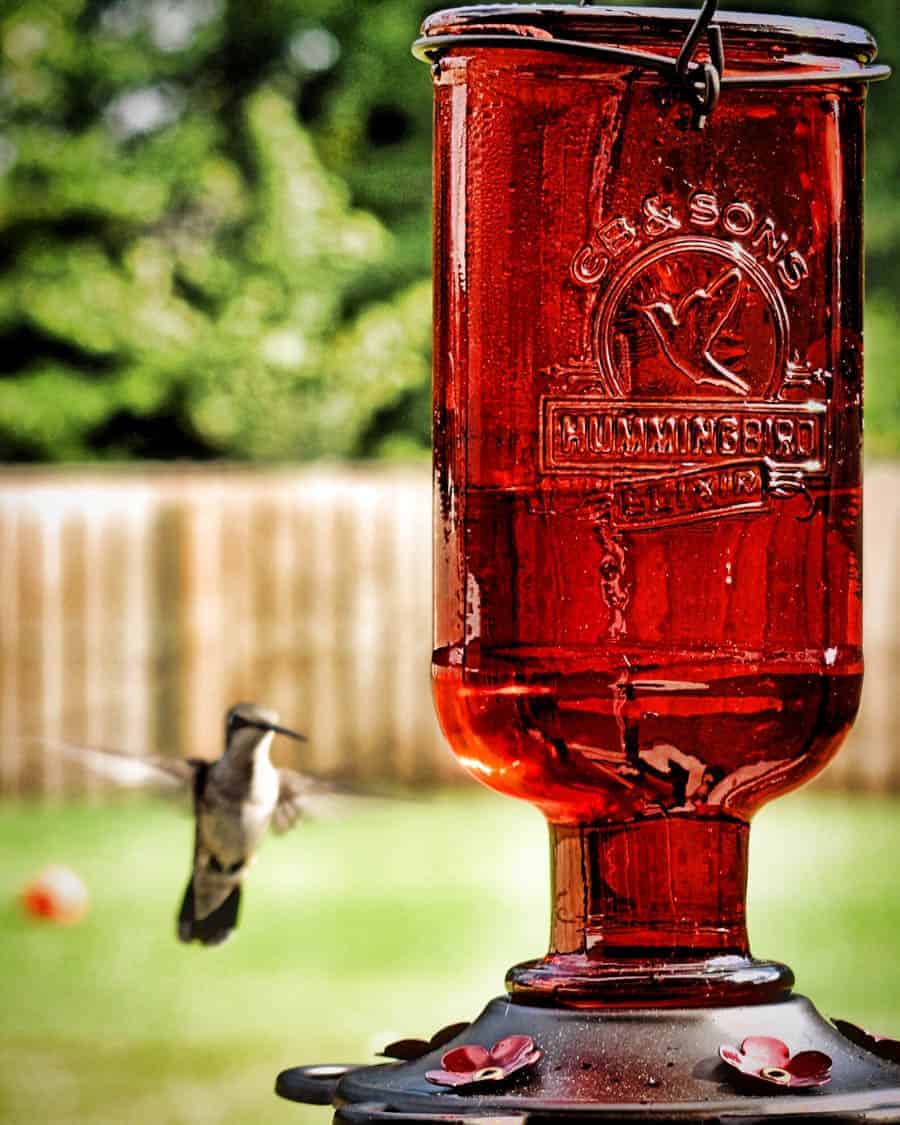
Table of Contents
- Homemade Hummingbird Food Recipe
- Easy Hummingbird Food Recipe
- Why Make Your Own Hummingbird Food
- Hummingbird Food Ingredients
- How to Make Hummingbird Food
- FAQs
- Expert Tips
- Ideas for Putting Hummingbird Feeders in Your Yard or Garden
- Plants to Attract Hummingbirds
- What is the Best Hummingbird Feeder?
- How to Clean a Hummingbird Feeder
- 10 Fun Facts About Hummingbirds
- More Fun Crafts, Activities & Recipes to Consider
- The Best Homemade Hummingbird Food Recipe
Homemade Hummingbird Food Recipe
I’ve written before about my adoration for the whimsical creatures that are hummingbirds. Previously I shared about how to attract them to your own yard in this blog post! They just fascinate me and bring so much joy and wonder to outdoor spaces.
I grew up watching their little bodies flit and flutter outside the window at my Grandma’s house, and ever since, I’ve always been delighted when they show up in my garden to feed on flowers or from my hummingbird feeder.
Easy Hummingbird Food Recipe
4 cups of water to 1 cup sugar
Why Make Your Own Hummingbird Food
My kids always get a kick out of observing these little guys, too. It’s just so much fun for the whole family! That’s why I want to share the simplest and best homemade hummingbird food with you all today. It’s two ingredients and couldn’t be easier (or faster) to make, and it’s sure to bring a few of these pretty birds to your yard this season.
I will advise right off the bat not to use red dye, which some sources say to mix into the food. Hummingbirds like the bright color red because it reminds them of sweet flowers, but just use a red feeder for the same effect since dye can be harmful to the little hummers’ health.
Homemade hummingbird food is inexpensive and a more healthy option than store-bought food. The commercial pre-made hummingbird food tends to have harmful chemicals and preservatives that are not healthy for the birds.
I love to make a batch of my favorite granola bar recipe snack (or a simple smoothie recipe), take a snack outside, and spend some time enjoying nature and these highly entertaining little critters. Seriously, they’re so entertaining and good for the soul.
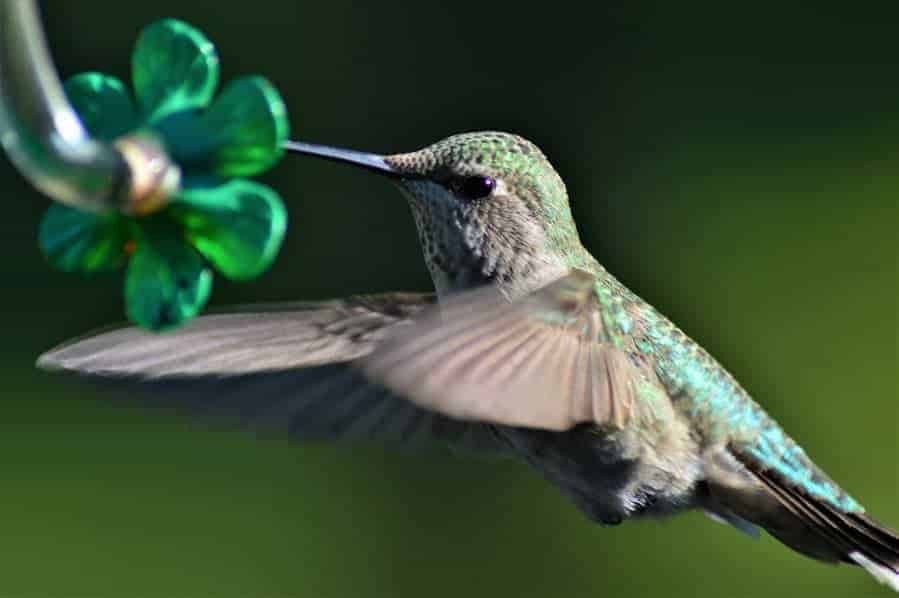
Hummingbird Food Ingredients
Homemade hummingbird food only requires two simple ingredients that I guarantee you have at home. To make this hummingbird food recipe, you’ll need:
- Hot water
- Granulated sugar
That’s it!
How to Make Hummingbird Food
- Simply boil the water, then remove from the heat.
- Add the sugar and stir until the sugar dissolves.
- Let the mixture cool completely, then pour into the hummingbird feeder.
Start keeping an eye on your feeder because once these beautiful birds realize there’s sweet sugar water for them to drink, they’ll start visiting your feeder as often as possible.
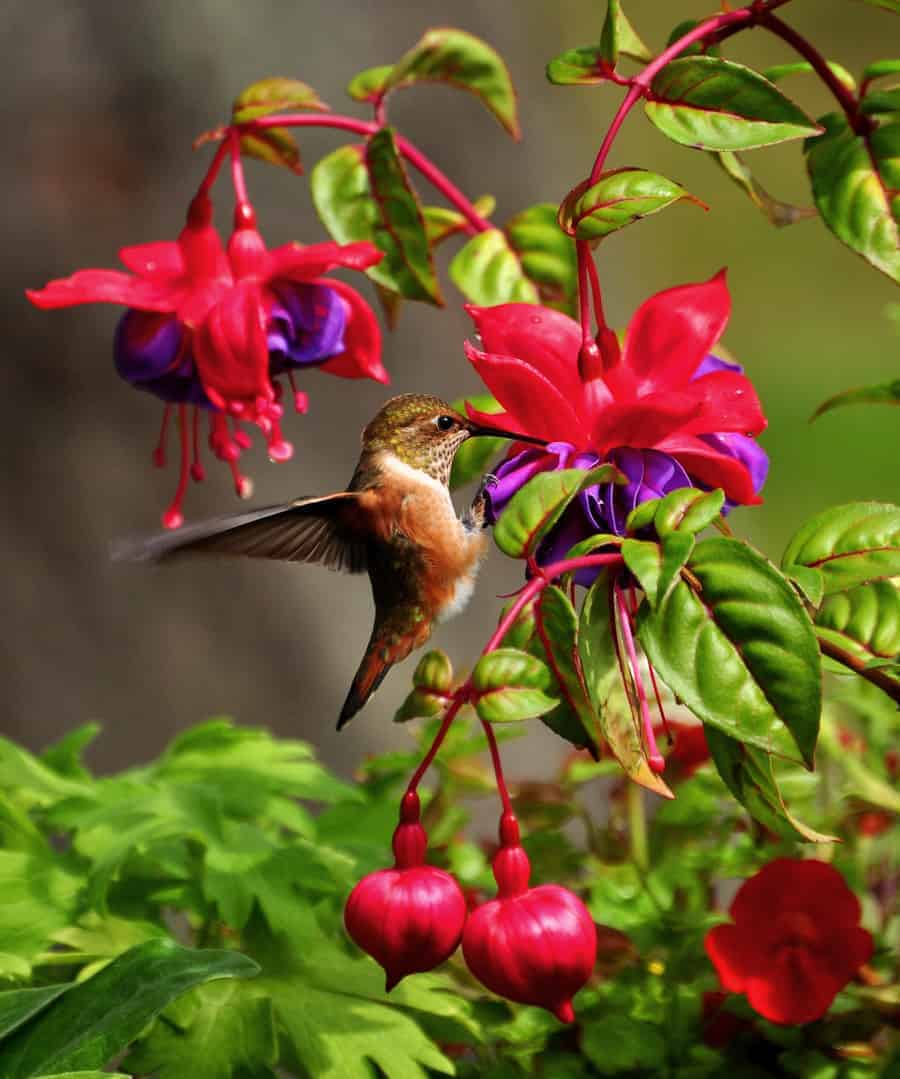
FAQs
You can! Just be sure to boil it before using so that it dissolves the sugar, and the boiling will remove any impurities.
You’ll want to use granulated white sugar—or regular table sugar. Do not use raw or unprocessed sugars, honey, or corn syrup because those can be harmful to hummingbirds’ health.
It’s recommended to boil the water to help clean it of any impurities that might be in the water.
Hummingbirds can often be seen feeding on nectar at dawn or dusk.
Expert Tips
- Refrigerate Sugar Water: Store leftover sugar water in the fridge for up to 2 weeks. If you notice mold growing in the mixture, toss it and make a fresh batch.
- When to Clean: Best practice is to change and clean out feeders every other day, but if you miss a time or two, just make sure you’re switching out the food and cleaning it out at least twice a week during warm months and once a week in cooler months. This helps to prevent mold growth.
- Don’t Use Red Dye: Foremost, red dye or red food coloring isn’t necessary because many feeders themselves are red—plus, dye is harmful to hummingbirds’ health, so be sure to skip it.
- Real Sugar Only: Please don’t use artificial sweeteners! Basic white cane sugar, or organic sugar, is just right for the birds.
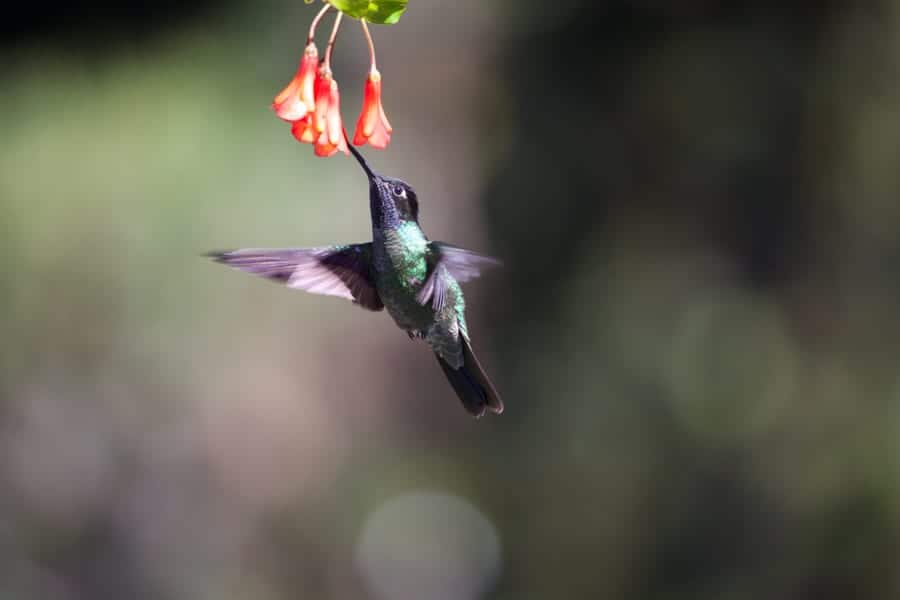
Ideas for Putting Hummingbird Feeders in Your Yard or Garden
Putting feeders in the right spot at the right time of year is crucial to bringing the birds back season after season. It’s also more inviting if your yard and garden have plants that attract and feed hummingbirds, too!
When to Put Out Feeders
Hummingbirds migrate with the seasons, so when you put out a hummingbird feeder depends on where you live.
- For those who lives in southern parts of the States, you can set up feeders from February through November.
- Across the middle of the country, plan on placing feeders from April through October.
- Along the northern states in the U.S., put hummingbird feeders out from early May through September.
Where to Put Feeders
Place your hummingbird feeder in low-activity areas (away from where pets or kids might play often because hummingbirds can be shy and territorial!). Close to trees is best because they like to perch on branches to watch out for predators.
Hummingbird feeders should be placed in partial sun. If your feeder is in the sun all day, it will spoil faster.
You want to put the feeder somewhere where you can see it but also somewhere that the hummingbirds feel comfortable. They don’t like to be out in the open, so the partial shade of a tree or bush, or hanging from a canopy or your house is a good location.
Plants to Attract Hummingbirds
Hummingbirds love flowers that are brightly colored and produce lots of nectar, including bee balm, trumpet honeysuckle, and bleeding hearts. They also really like red tubular flowers.
(Source)
Here are some fun ways to learn more about attracting these special birds to your garden!
- Little Known Ways to Attract Hummingbirds to your Garden
- What kind of Hummingbird is that? The Most Common Hummingbirds in North America
- The Best Ways to Set Up a Hummingbird Feeder
- The Best Hummingbird Feeders You Will Want to Buy
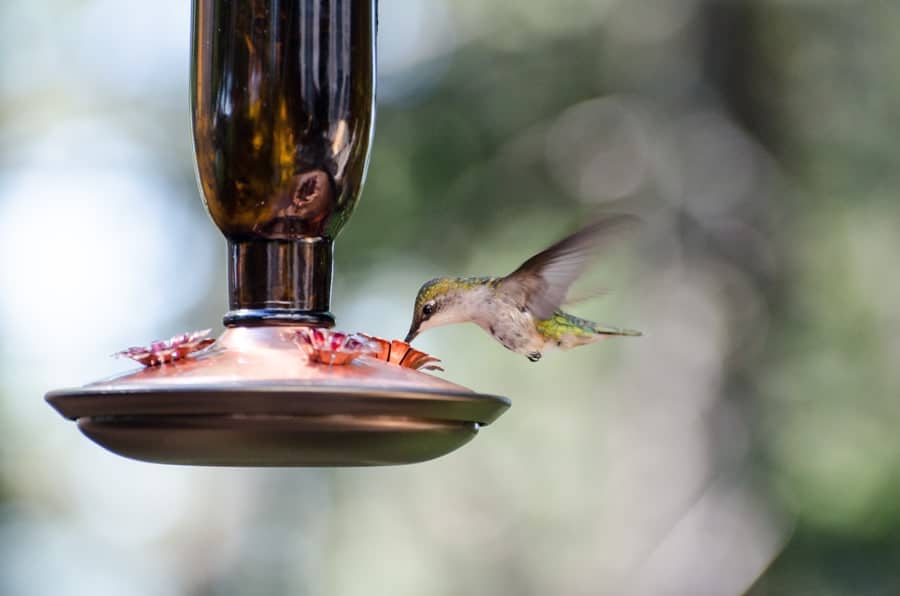
What is the Best Hummingbird Feeder?
A good hummingbird feeder should be sturdy, have lots of red on it, be easy to wash, fill, and hang, AND it should be a good price.
This glass hummingbird feeder from Kingsyard is one of my absolute favorites. Besides its pretty appearance, it’s super sturdy and easy to clean. It can hold up to 24 ounces of bird food and has 6 feeding ports that are all leak-resistant. Plus, it’s available in 6 different bright colors, all of which are guaranteed to attract hummingbirds galore to your outdoor space!
I also like:
- Nature’s Rhythm Red Antique Glass Bottle Hummingbird Feeder (holds 28 ounces, 5 feeding spots)
- Juegoal Glass Hummingbird Feeders (holds 26 ounces, 5 feeding spots)
- Sewanta Hummingbird Feeders, plastic (holds 32 ounces, 10 feeding spots, pack of 2 feeders)
How to Clean a Hummingbird Feeder
It is important to regularly clean feeders to avoid mold growth and protect the delicate hummingbirds. Every other day is recommended.
Rinse your bird feeder with very hot water. It is advised not to use soap because the residue can change the flavor of the nectar. Use a small brush to clean in an holes or crevices.
How to Clean Hummingbird Feeder with Vinegar
A deeper cleaning of your hummingbird feeder is in order about once a month. To disinfect, soak your feeder in vinegar or hydrogen peroxide. Combine 1 part vinegar and 2 parts water. Take the feeder completely apart and let it soak in a bucket for 1-2 hours.
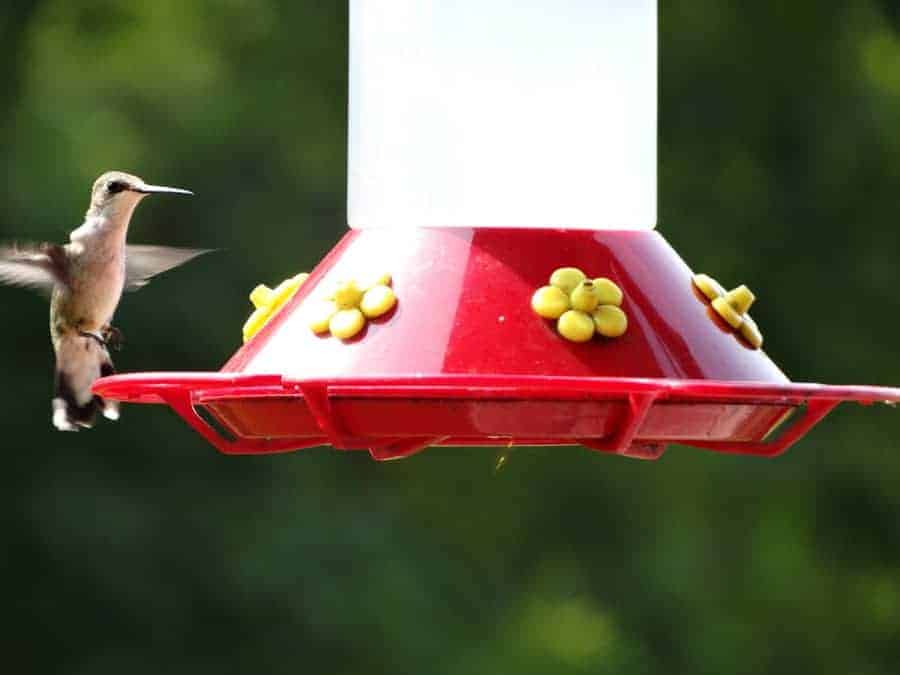
10 Fun Facts About Hummingbirds
Hummingbirds are truly remarkable little creatures. Check out these fun little factoids:
- A hummingbird’s heart beats about 1,200 beats per minute. Just to compare, on average, a human heart beats 60-100 beats per minute.
- Hummingbirds have very good eyesight but have no sense of smell.
- The smallest eggs of all birds are laid by hummingbirds. They are only 1/2-inch long. Their eggs are tinier than a jelly bean!
- Hummingbirds can fly up to 30 mph.
- On average, hummingbirds eat 5-7 times an hour. They have a very high metabolism. Hummingbirds consume half of their body weight in sugar over the course of a day.
- Hummingbirds have fewer feathers than any other species, around 1,500. They are small, so they don’t require as many feathers, but having fewer feathers also keeps them lighter and more able to fly.
- Hummingbirds are the only birds that can fly in any direction. They can fly up, down, sideways, forward, and backward.
- The life span for hummingbirds, on average, is 3-5 years.
- The memory of a hummingbird is impeccable. They remember every feeder and flower they have flown to.
- The females are the nest builders in the hummingbird world. They only lay 2 eggs at a time, and their young stay in the nest for about 3 weeks.
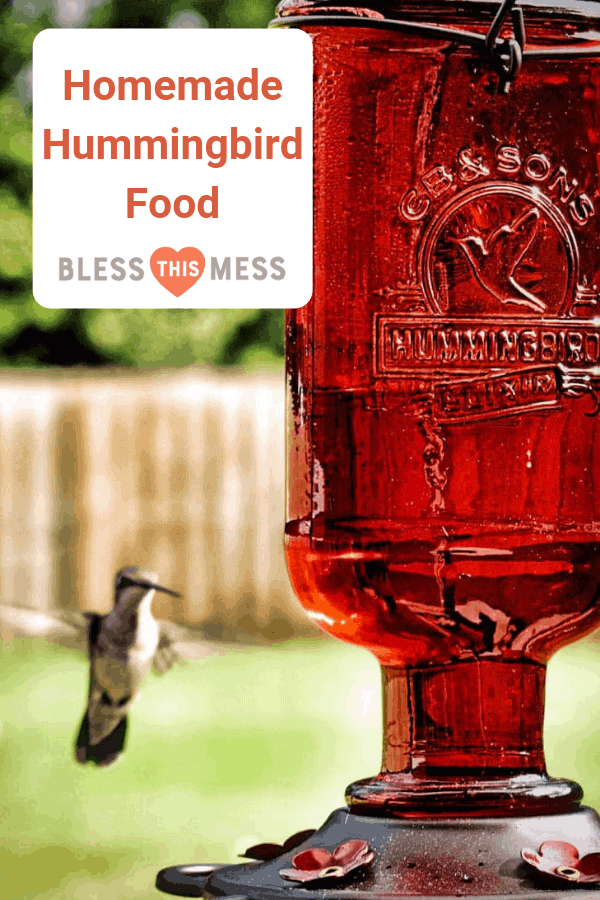
More Fun Crafts, Activities & Recipes to Consider
Preserving Guide
How To Preserve Asparagus
Preserving Guide
How To Preserve Apricots
Preserving Guide
How To Preserve Apples
Did you make this recipe? Leave a ⭐️ review and share it on Instagram, Facebook, or Pinterest!
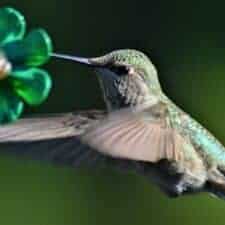
The Best Homemade Hummingbird Food
Equipment
Ingredients
- 4 cups very hot tap water
- 1 cup white granulated sugar
Instructions
- Boil your water on the stove for 1 minute.
- Remove the water from the stove and stir in the sugar. Stir until the sugar dissolves.
- Allow the mixture to come to room temperature.
- Fill your humming bird feeder as directed on individual instructions.
- Store leftover sugar water in the fridge for up to 2 weeks.
Notes
- If there are noticeable signs of mold on your sugar water before 2 weeks, discard and make a fresh batch.
- Please do NOT use red dye. Red dye is harmful to hummingbirds. Use a red feeder to attract them instead of dyeing their food.
- Don’t use raw or natural sugars—they contain too much iron that can hurt hummingbirds.
- Do not use honey or corn syrup.

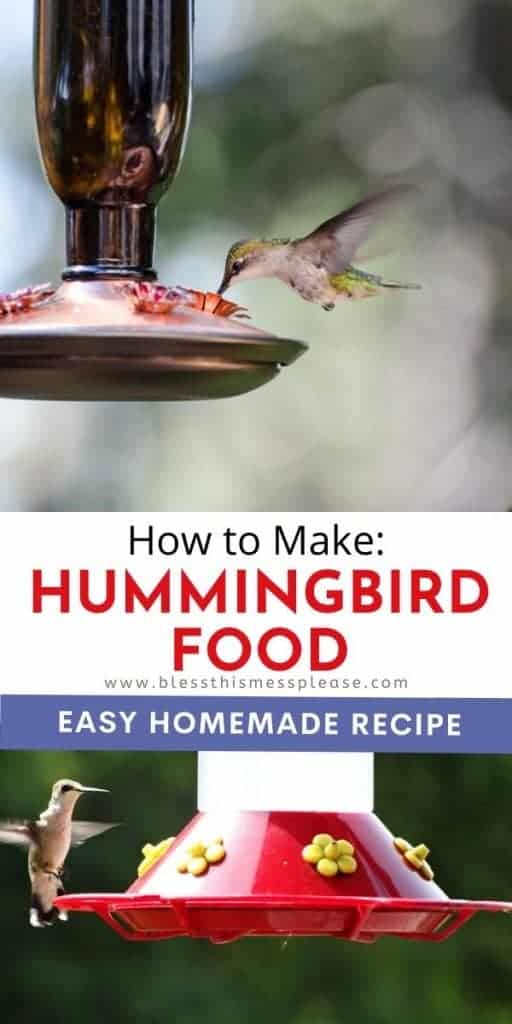
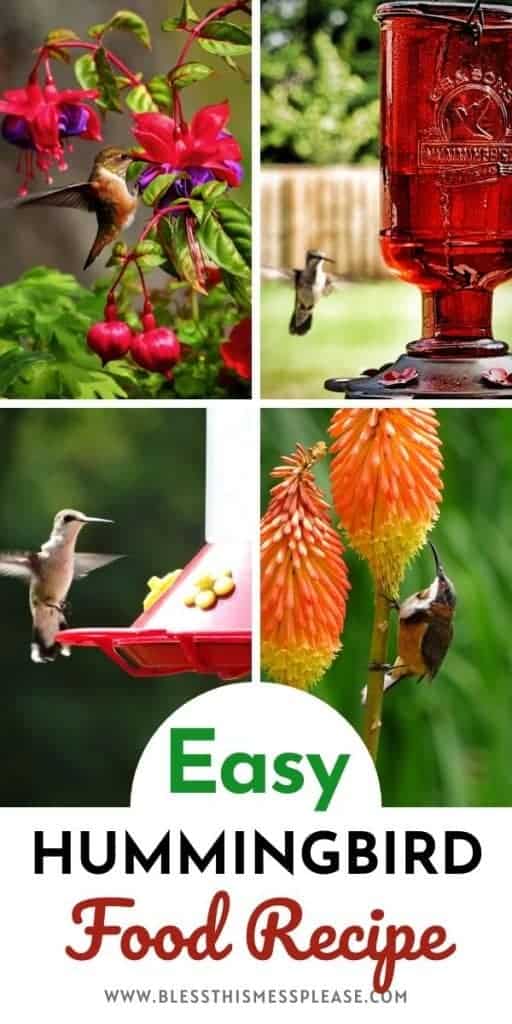
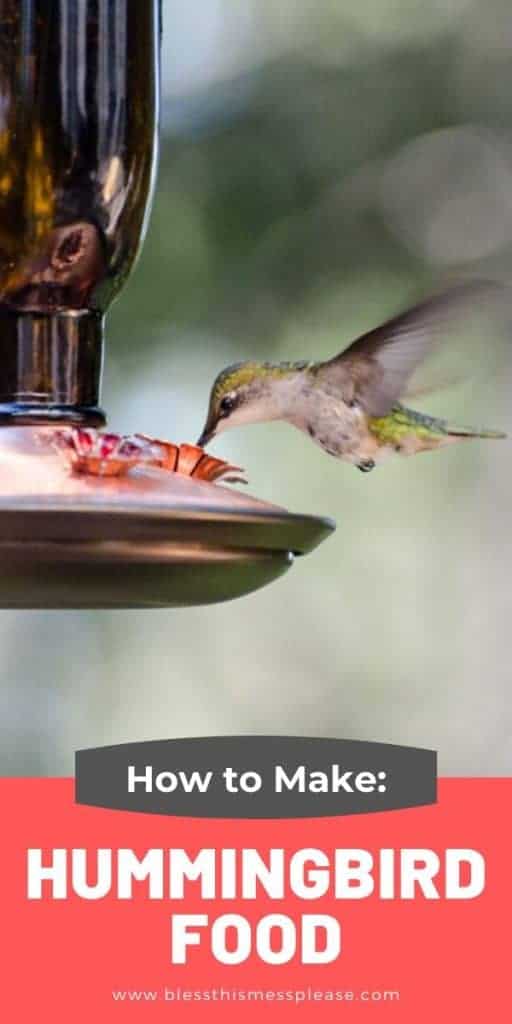
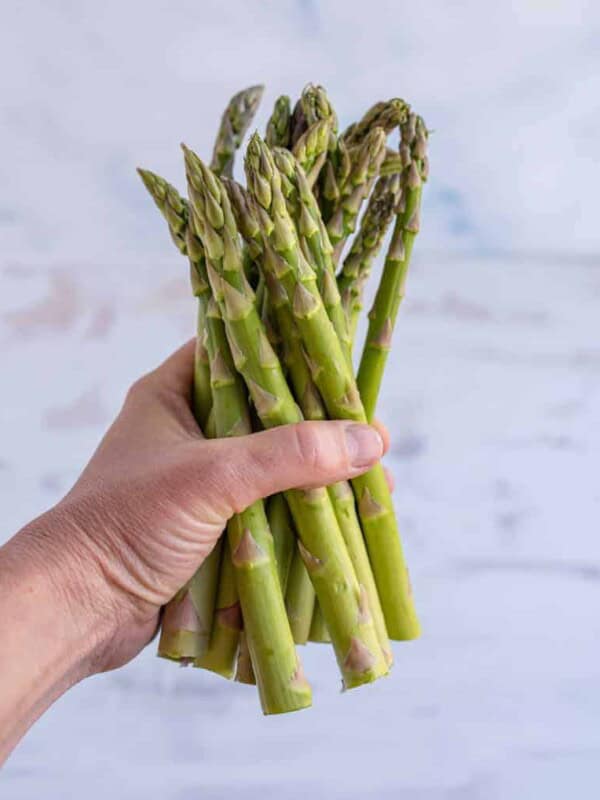
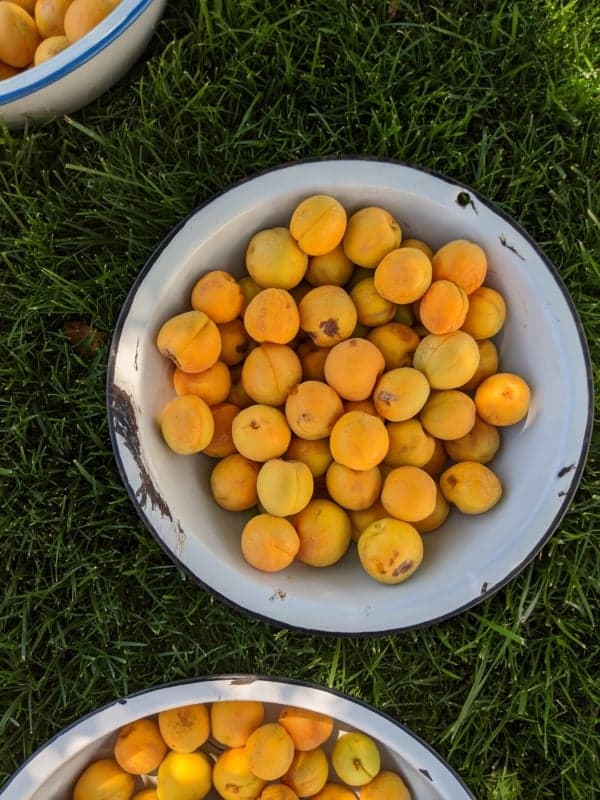
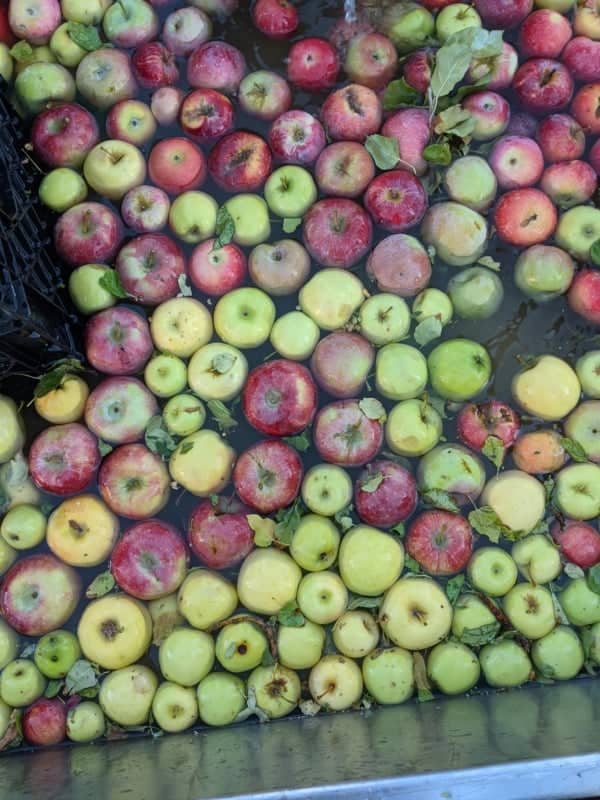
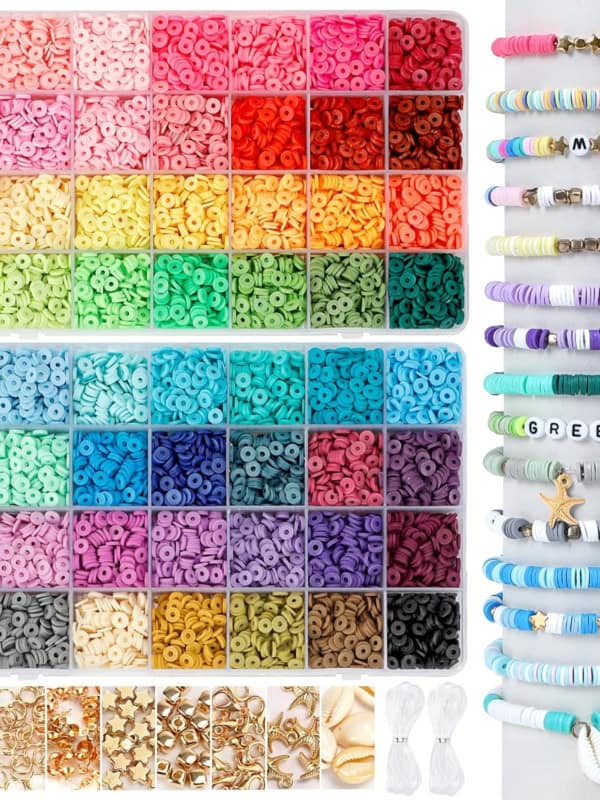






I have heard that you shouldn’t use hot water from the tap for cooking. Hot water heaters tend to allow water to become less pure, as the water evaporates from the heat and is replaced to evaporate again, leaving higher concentrations of metals and impurities.
Actually, there is no evaporation in a hot water tank as it is sealled. If there are sediments in your water the hot water tank volume and less frequent use allows time to settle out.. Want proof? There are filters at the inlets of all,clothes washers – the hot is always clean and the cold will likely show contaminates.
That us logical & well water not filtered could have many minerals. But cold water boiled would be fresher.
Due to corona virus my husband could only obtain powdered sugar. Can I use it to make nectar? If so at what ratio? Also, I have been doing 3 to one of granulated sugar – is that bad for them? They love my super sweet feeders, but I do not want to harm my 20+ visitors at one time to my feeders.
Powdered sugar normally has things like cornstarch added. I think I’d wait until you had regular sugar to feed your birds!
Too much sugar can harm their kidneys. 4 to 1 ratio is best. 2 cups water and 1/2 cup granulated sugar.
Beautiful feeder! I’d love to have one like that! Where’s it from?
There are a few styles like this on Lowe’s & Amazon. The bottle part is glass & the rest is mostly metal.
Sams club last week
Sams club last week
Thank you for the recipe and tips, it is my first time setting up a humming bird feeder. It was at gift from a dear friend this past Christmas and can’t wait to share pics and hang it up!
Enjoy new friends in your yard!
I thought I read once, you have to boil the water for 2-3 min. to get rid of the additives to tap water. Fact or Fiction?
I think it depends highly on how your tap water is treated, if you have a well or a spring fed/untreated system there wouldn’t be much to boil out. You certainly can if you’d like!
If I bought a clear feeder what can I add to give the food color other the red dye
If it is a hummingbird feeder-it will have an attractive enough doo-hicky around the sipping stations that they will be just fine and figure it out. A lot of them are used to feeding from feeders-so it isn’t a new thing for them. You could also just tie a red ribbon up where the feeder is attached to the tree or hook. Make sure it isn’t so they can get caught in it.
It is best NOT to add red coloring. I never have and the container is clear, but that does not stop the little birds from coming and enjoying it. The top and base are red with the tiny yellow flowers, which could be the reason they are drawn, but no need to color the water.
The hubby is taking charge of the hummer feeders this year. After reading all of your hummingbird articles, he’s been shopping for and planning where to place some more feeders and encouraging me to add some new flowers around the house. With the sugar water recipe in hand, he is now ready to roll! Thanks for all the info!!!!
Ohhh I love that! I can’t wait to see some pictures!
I’ve been cleaning around my yard. Its almost time to put up my hummingbird feeders. I’m excited for spring! Thanks for the recipe for their food! This works great and saves lots of trips to the store!
Is it ok to add a touch more sugar or does that throw off the flavor?
I’m sure that’ll be great!
Hi Melissa, I enjoy your blog and I love hummingbirds. However, the idea that red dye is harmful to hummingbirds is a myth.
According to The Backyard Bird Feeders Bible by Sally Roth, 2000, “The truth is that there are no scientific studies that indicate a negative effect on hummingbirds from red dye. However, the rest of the story is that colored nectar doesn’t attract any more hummingbirds that clear nectar, as long as there’s a bit of red plastic near the feeding ports.”
If you google “red dye in hummingbird feeders’, you will similar results.
I have been a very amateur bird watcher for about 25 years. Post more bird photos! I bet others will enjoy them as much as I will.
Nama Webb
I would be suspicious of this information. In humans-red dye has been linked with hyperactivity and allergic responses. Since it isn’t necessary-skip it-for the birds and the humans and the planet! It is a chemical in most things and does not stem from natural sources like beets or tomatoes unless it says so.